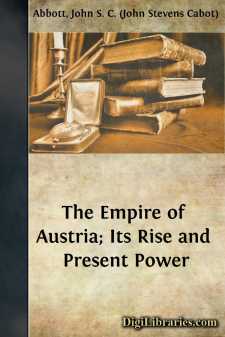History
- Africa 30
- Americas (North Central South West Indies) 50
- Ancient 68
- Asia 58
- Australia & New Zealand 8
- Canada 41
- Caribbean & West Indies 1
- Civilization 20
- Eastern Europe 12
- Europe 310
- Expeditions & Discoveries 60
- General 77
- Historical Geography 1
- Jewish 9
- Latin America 3
- Medieval 8
- Middle East 13
- Military 248
- Revolutionary 8
- Study & Teaching 5
- United States 353
- Western Europe 56
- World 13
History Books
Sort by:
by:
Walter Raleigh
INTRODUCTORY NOTE Sir Walter Raleigh may be taken as the great typical figure of the age of Elizabeth. Courtier and statesman, soldier and sailor, scientist and man of letters, he engaged in almost all the main lines of public activity in his time, and was distinguished in them all. His father was a Devonshire gentleman of property, connected with many of the distinguished families of the south of...
more...
by:
Edward Gleichen
In accordance with the order received at Belfast at 5.30 P.M. on the 4th, the 15th Brigade started mobilizing on the 5th August 1914, and by the 10th was complete in all respects. We were practically ready by the 9th, but a machine-gun or two and some harness were a bit late arriving from Dublin—not our fault. Everything had already been rehearsed at mobilization inspections, held as usual in the...
more...
by:
Hall Caine
THE INVISIBLE CONFLICT Mr. Maeterlinck has lately propounded the theory {*} that what we call the war is neither more nor less than the visible expression of a vast invisible conflict. The unseen forces of good and evil in the universe are using man as a means of contention. On the result of the struggle the destiny of humanity on this planet depends. Is the Angel to prevail? Or is the Beast to prolong...
more...
THE ACCESSION OF CHARLES X Thursday, the 16th of September, 1824, at the moment when Louis XVIII. was breathing his last in his chamber of the Chateau des Tuileries, the courtiers were gathered in the Gallery of Diana. It was four o'clock in the morning. The Duke and the Duchess of Angouleme, the Duchess of Berry, the Duke and the Duchess of Orleans, the Bishop of Hermopolis, and the physicians...
more...
by:
Brooks Adams
CHAPTER I I wrote this little volume more than thirty years ago, since when I have hardly opened it. Therefore I now read it almost as if it were written by another man, and I find to my relief that, on the whole, I think rather better of it than I did when I published it. Indeed, as a criticism of what were then the accepted views of Massachusetts history, as expounded by her most authoritative...
more...
CHAPTER I. RHODOLPH OF HAPSBURG. From 1232 to 1291. Hawk's Castle.—Albert, Count of Hapsburg.—Rhodolph of Hapsburg.—His Marriage and Estates.—Excommunication and its Results.—His Principles of Honor.—A Confederacy of Barons.—Their Route.—Rhodolph's Election as Emperor of Germany.—The Bishop's Warning.—Dissatisfaction at the Result of the Election.—Advantages...
more...
PREFACE ON my return from another visit to Japan a few months ago I found those persons in this country with whom I was brought into close association extremely curious and strangely ignorant regarding that ancient Empire. Despite the multitude of books which have of late years been published about Japan and things Japanese a correct knowledge of the country and the people is, so far as I can judge,...
more...
by:
Harriett Bradley
INTRODUCTION The enclosure movement—the process by which the common-field system was broken down and replaced by a system of unrestricted private use—involved economic and social changes which make it one of the important subjects in English economic history. When it began, the arable fields of a community lay divided in a multitude of strips separated from each other only by borders of unplowed...
more...
by:
Leslie Stephen
CHAPTER I JAMES MILL I. EARLY LIFE Bentham's mantle fell upon James Mill. Mill expounded in the tersest form the doctrines which in Bentham's hands spread into endless ramifications and lost themselves in minute details. Mill became the leader of Bentham's bodyguard; or, rather, the mediator between the prophet in his 'hermitage' and the missionaries who were actively engaged...
more...
by:
George Pearson
CHAPTER I Polygon Wood Ypres and Hill 60—Preparing for the Gas—Why the Patricias Cheered—The Retirement—The Thin Red Line. The Princess Patricias had lain in Polygon Wood since the twentieth of April, mid-way between the sanguinary struggles of St. Julien and Hill 60, spectators of both. Although subjected to constant alarm we had had a comparatively quiet time of it, with casualties that had...
more...











